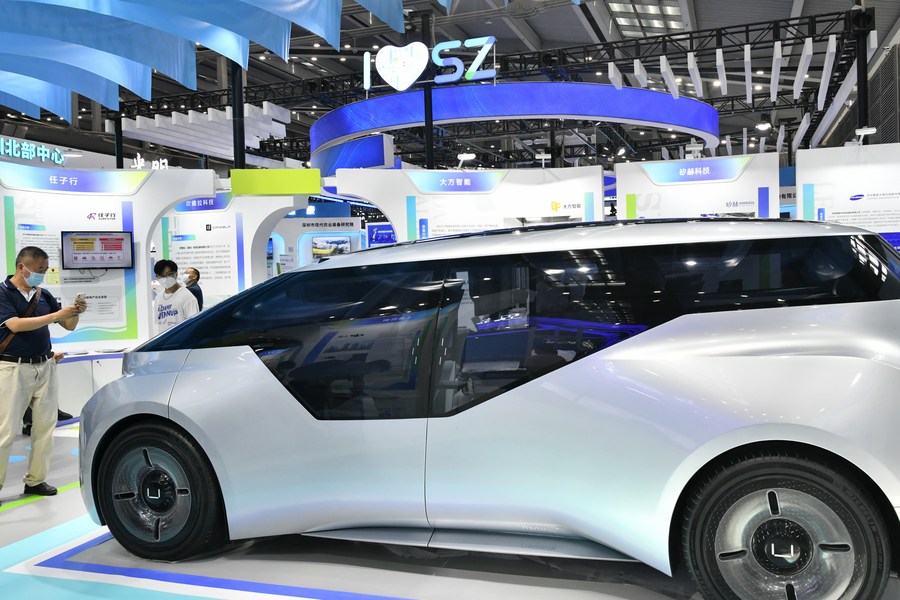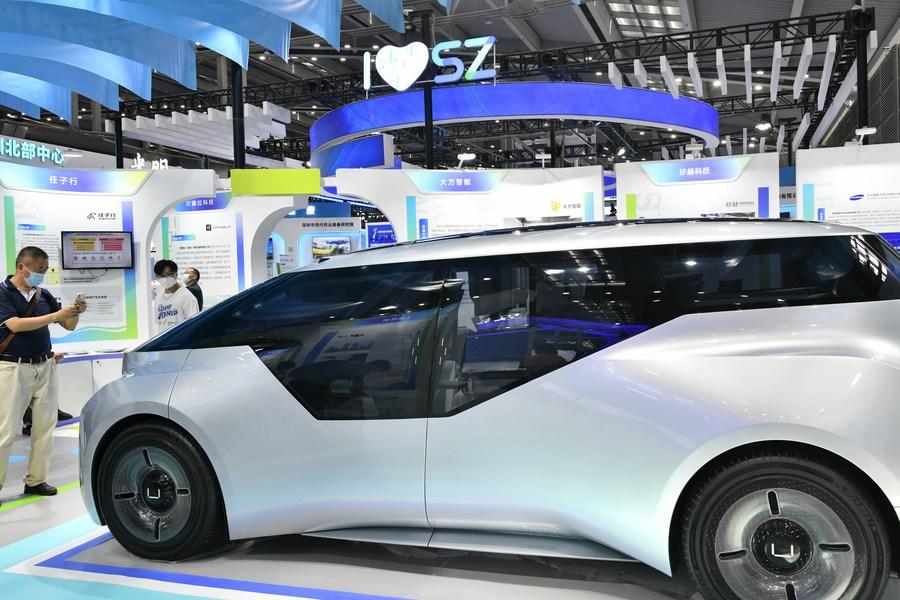
This photo taken on Nov. 16, 2022 shows a smart electric vehicle at the 24th China Hi-Tech Fair (CHTF) in Shenzhen, south China's Guangdong Province. (Xinhua/Liang Xu)
BEIJING, Nov. 16 (Xinhua) -- Multiple cities in China have recently released official documents to further expand pilot areas for intelligent connected vehicles (ICVs) and enhance policy support for the sector.
As the ICV sector is currently undergoing a stage of advancement and upgrading, various cities have introduced corresponding support policies to address industry pain points such as infrastructure transformation and improvement of industrial chains, helping promote the application of ICVs at a larger scale in China, according to an industry insider.
-- Pilot areas continue to expand
On October 19, Suzhou City of east China's Jiangsu Province launched a road test and demonstration application of ICVs, with plans to expand its scale to cover the entire city.
On November 7, a forum featuring intelligent transportation held in east China's Shanghai revealed that test environments for ICVs will be provided at a larger scale with more diverse scenarios in areas including the city's Pudong Airport.
China's Optics Valley, or the East Lake High-tech Development Zone, in Wuhan, capital of central China's Hubei Province recently announced at a press conference that in the next three years, it will establish over 800 kilometers of open test roads for ICVs.
Since 2017, several departments in China, including the Ministry of Industry and Information Technology (MIIT), the Ministry of Public Security, the Ministry of Transport and the Standardization Administration, have issued series of documents regarding management specifications for road tests and demonstration applications of ICVs, following which many regions have marked out designated areas for such trial.
According to data from the MIIT, currently there are altogether over 20,000 kilometers of roads open for ICV tests in China, whereas 17 road-test demonstration zones, 16 pilot cities to promote the coordinated development of smart city infrastructure and ICVs, and 7 national demonstration zones for internet of vehicles have completed intelligent upgrading and transformation of over 7,000 kilometers of roads in total. The MIIT recently announced to launch pilot projects for comprehensive electrification of vehicles used for public transport and for ICVs' on-road use.
The expansion of pilot projects is conducive to promoting large-scale deployment of ICVs while establishing relevant standards and verified test capabilities, according to Chu Wenbo, CEO of the Western China Science City Innovation Center of Intelligent and Connected Vehicles.
-- Roads upgraded to cater to ICVs
As the pilot projects for ICVs continue to expand, cities including Suzhou, Wuhan and southwest China's Chongqing have recently upgraded their support policies to address pain points in the development of ICVs.
At the VanJee intelligent transportation system autonomous driving road section in Suzhou, real-time data of vehicles and pedestrians passing by is continuously uploaded, allowing test vehicles to detect road conditions of intersections from even several hundred meters away or around several corners.
Intelligent vehicle infrastructure cooperative system, involving the development of both vehicles and road infrastructure construction, is important groundwork for further development of ICVs, according to a representative with VanJee Technology, noting that intelligent transformation on test roads is of great significance for effective collection and transmission of road information.
Actively strengthening the construction of road networks for ICVs, the city of Suzhou is expecting its total length of roads transformed for ICVs to exceed 1,000 kilometers by 2025, with over 3,000 demonstration and application vehicles, along with 5,000 roadside units for edge perception and computing, gradually achieving large-scale commercial applications of high-level autonomous driving systems.
Yongchuan District in Chongqing has been making continuous efforts to promote the construction of ICV-related infrastructure, upgrading dozens of intersections, applying technologies such as V2X (vehicle-to-everything), roadside perception, edge computing and communication, according to an official with relevant department in the district.
-- Industrial chains improved through policy support
In addition to making roads smarter, relevant policies are also introduced to help improve the industrial chain of ICVs.
The cost of essential components such as sensors for ICVs remains high, said Chu, pointing out that promoting independent innovation within relevant industrial chains and strengthening agglomeration effects will help lower the technological application threshold, thereby expanding the scale of implementation.
At the East Lake High-tech Development Zone, significant efforts are made to attract enterprises in the ICV industrial chain. To address the common challenges faced by these enterprises, the zone released cost-saving policies including rental cost reduction, allowing enterprises to enjoy subsidies of up to 10 million yuan (about 1.38 million U.S. dollars).
Suzhou is also actively promoting the development of ICV industrial chains. Represented by Nantiancheng Road, a trunk road in Suzhou High-speed Rail New Town, the city has attracted more than 140 ICV enterprises, spanning over 30 sub-sectors, such as intelligent driving technology solutions, complete vehicles and radar, cultivating a cluster of leading enterprises that specialize in autonomous driving core algorithms, new sensors and so on.
The development of China's ICV industry has received increasing attention and support. According to the Technical Guidelines for Highway Engineering Facilities Supporting Automated Driving issued by the Ministry of Transport, the key objectives for highway transport development are to continuously improve traffic efficiency and enhance transportation safety. The emergence of autonomous driving technology has provided new ideas and technical paths for achieving these objectives. (Edited by Yu Huichen with Xinhua Silk Road, yuhuichen@xinhua.org)




 A single purchase
A single purchase









